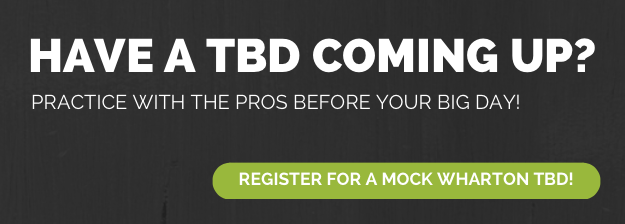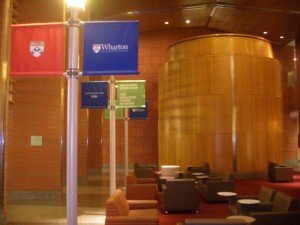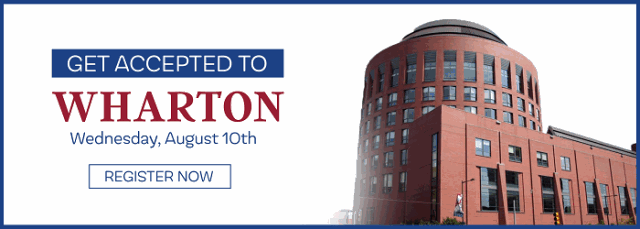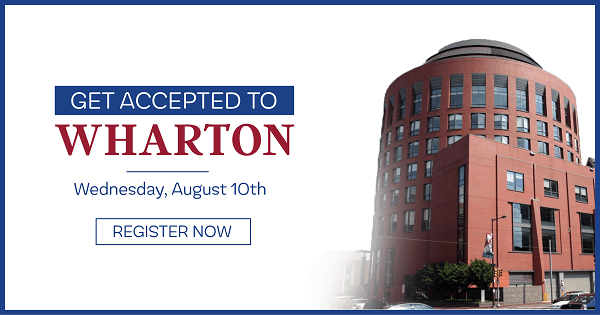Events & Promotions
|
|

GMAT Club Daily Prep
Thank you for using the timer - this advanced tool can estimate your performance and suggest more practice questions. We have subscribed you to Daily Prep Questions via email.
Customized
for You
Track
Your Progress
Practice
Pays
Not interested in getting valuable practice questions and articles delivered to your email? No problem, unsubscribe here.
- Nov 19
09:00 AM PST
-10:00 AM PST
What’s in it for you- Live Profile Evaluation Chat Session with Jenifer Turtschnow, CEO ARINGO. Come with your details prepared and ARINGO will share insights! Pre-MBA Role/Industry, YOE, Exam Score, C/GPA, ECs Post-MBA Role/ Industry & School List. - Nov 19
10:00 AM EST
-01:00 PM EST
Get expert MBA strategy, instant essay feedback, and personalized advice on your entire application. Join My Admit Coach, the AI-powered MBA admissions platform built on 10K+ successful application docs for HBS, Stanford GSB, MIT and other top programs. - Nov 19
11:00 AM EST
-12:00 PM EST
Looking to secure a coveted spot at a top business school? Our team of seasoned MBA admissions consultants, including top B schools alumni and industry leaders, is here to help turn your dreams into reality. Let’s kick-start your journey to success! - Nov 19
11:00 AM PST
-12:00 PM PST
Round 2 is here — and it’s your chance to make your MBA dream happen! Join GMAT Club’s LIVE discussion with two top experts from The Red Pen, Gunjan Jhunjhunwala and Natasha Mankikar, as we break down everything you need to know - Nov 12
01:00 PM EST
-11:59 PM EST
Get expert MBA strategy, instant essay feedback, and personalized advice on your entire application. Join My Admit Coach, the AI-powered MBA admissions platform built on 10K+ successful application docs for HBS, Stanford GSB, MIT and other top programs. - Nov 18
11:00 AM PST
-12:00 PM PST
Join us in a live GMAT practice session and solve 30 challenging GMAT questions with other test takers in timed conditions, covering GMAT Quant, Data Sufficiency, Data Insights, Reading Comprehension, and Critical Reasoning questions. - Nov 20
10:00 AM EST
-10:30 AM EST
If you’re applying to Columbia, NYU Stern, or Yale SOM, you need more than strong stats. Each school defines “leadership” differently, and your essays must reflect that. Join Sia Admissions founder, Susan Berishaj on November 20th - Nov 20
09:00 PM IST
-10:00 PM IST
Join our free expert-led Essay Workshops to discover how to choose impactful stories, highlight your core values, and align your background with each school’s distinct culture, making every word truly count. - Nov 21
08:30 AM EST
-09:15 AM EST
Get the inside scoop on what makes Emory’s Goizueta Business School great, learn how you can present a strong MBA application, and connect with an Admissions Director to get your questions answered. - Nov 21
09:30 PM IST
-10:30 PM IST
Learn how to craft powerful, authentic essays by mastering the 3 “WHYs” every top MBA program looks for: Why MBA, Why Now, and Why This School. - Nov 24
08:00 PM PST
-09:00 PM PST
Inquire for a free profile evaluation and guarantee statement for possible admits and scholarships!
Kudos
Bookmarks
[caption id="attachment_35700" align="alignright" width="300"]
Be nice - build on one another’s comments, not cut them down.
[/caption]
Wharton’s interview invitations are out and some of you are lucky enough to be facing Wharton’s innovative Team-Based Discussion, also known as the TBD. Personally, I consider this evaluation method an excellent idea, as much of business school life consists of team-based discussion; it was certainly a big part of my life at Sloan.
Because group evaluation is fairly unusual in the admissions process, interviewees are no doubt nervous about it.
So, how should you handle yourself during this discussion in a way that appeals to Wharton? Here’s some advice.
1. Don’t be confrontational. This is not a presidential candidate debate. In a business school classroom or project group, participants in discussions tend to build on one another’s comments, not cut each other down. These are very smart people, so a show of respect is warranted and disagreements should be handled gracefully.
2. Don’t hog the conversation. Like other teaching assistants at Sloan who regularly scored students on their participation in class, I graded based on the quality of their comments and what they added to the discussion, not on the quantity of their comments. Chatter is not appreciated in business school conversations; thoughtful points and succinct comments are, and no doubt the same will be true of these Wharton sessions.
3. Keep it real. This year’s Wharton prompt is a fairly practical one about planning a one-day conference. Prepare to discuss existing clubs and conferences, and be ready to plan something new that will contribute to the Wharton community. Also, be ready to support your comments with examples from your own background – either what you’ve experienced firsthand, or what you’ve observed up close.


By R. Todd Kingan MIT MBA, who has worked with MBA applicants since 2001. Todd can help you make the most of your strengths and mitigate your weaknesses.
Related Resources:
• Understanding the MBA Team-Based Interviews
• How to Prep for Your MBA Interviews [short video]
• How to Ace Your Team Based Interview: 4 Tips for the Big Day
This article originally appeared on blog.accepted.com.
Applying to a top b-school? The talented folks at Accepted have helped hundreds of applicants get accepted to their dream programs. Whether you are figuring out where apply, writing your application essays, or prepping for your interviews, we are just a call (or click) away.
Contact us, and get matched up with the consultant who will help you get accepted!

Be nice - build on one another’s comments, not cut them down.
[/caption]
Wharton’s interview invitations are out and some of you are lucky enough to be facing Wharton’s innovative Team-Based Discussion, also known as the TBD. Personally, I consider this evaluation method an excellent idea, as much of business school life consists of team-based discussion; it was certainly a big part of my life at Sloan.
Because group evaluation is fairly unusual in the admissions process, interviewees are no doubt nervous about it.
So, how should you handle yourself during this discussion in a way that appeals to Wharton? Here’s some advice.
1. Don’t be confrontational. This is not a presidential candidate debate. In a business school classroom or project group, participants in discussions tend to build on one another’s comments, not cut each other down. These are very smart people, so a show of respect is warranted and disagreements should be handled gracefully.
2. Don’t hog the conversation. Like other teaching assistants at Sloan who regularly scored students on their participation in class, I graded based on the quality of their comments and what they added to the discussion, not on the quantity of their comments. Chatter is not appreciated in business school conversations; thoughtful points and succinct comments are, and no doubt the same will be true of these Wharton sessions.
3. Keep it real. This year’s Wharton prompt is a fairly practical one about planning a one-day conference. Prepare to discuss existing clubs and conferences, and be ready to plan something new that will contribute to the Wharton community. Also, be ready to support your comments with examples from your own background – either what you’ve experienced firsthand, or what you’ve observed up close.


By R. Todd Kingan MIT MBA, who has worked with MBA applicants since 2001. Todd can help you make the most of your strengths and mitigate your weaknesses.
Related Resources:
• Understanding the MBA Team-Based Interviews
• How to Prep for Your MBA Interviews [short video]
• How to Ace Your Team Based Interview: 4 Tips for the Big Day
This article originally appeared on blog.accepted.com.
Applying to a top b-school? The talented folks at Accepted have helped hundreds of applicants get accepted to their dream programs. Whether you are figuring out where apply, writing your application essays, or prepping for your interviews, we are just a call (or click) away.
Contact us, and get matched up with the consultant who will help you get accepted!
Kudos
Bookmarks
 By Adam Hoff, Amerasia Consulting Group
By Adam Hoff, Amerasia Consulting GroupTime to break out an annual PSA here. I'm talking all alarms ringing, sirens, whatever it takes to get your attention. By "you" I mean: anyone applying to business school. You need to stop doing something immediately. Here it is:
STOP TRYING TO "DIFFERENTIATE" YOURSELF. [/b]
Or at least, stop doing it without a professional by your side. Let's dive into the 4 Rules of Differentiation before someone gets hurt.
Rule #1 - Do not "differentiate yourself" with a panicked career change. [/b]Throwing a Hail Mary at the last second is not a good idea. Trying to scramble to a cooler or sexier or "more noble" company is not going to make you stand out as a candidate - it's going to make you look directionless or (worse) fake. Now, some people change jobs (even right before applying) and that is fine, as long as there is a logical reason for it - ranging from "I hate my current job and may walk into traffic unless I leave it" to "this is a unique opportunity that I have to take." However, don't change just to change under some faulty logic that they are going to see "Adam Hoff, SpaceX" rather than "Adam Hoff, J.P. Morgan" and start doing backflips. If there is no logical reason to go work at SpaceX, then don't go work there. They look at your whole resume - and mainly to see what skills you have, not what brands you racked up - so it's not like changing the "current employer" line is going to change the formula for who you are. This is all risk, no reward. Would you do anything else in your life that is "all risk, no reward"? I am guessing not.
Rule #2 - Listing a hard job to get as your short-term goal is not "differentiating." If you only read one rule, read this one. Please! Read it again. Done? Read it again. Okay, you get the point. I have heard many, many times the past two years the idea from candidates that they want to pick post-MBA job X or Y because it will help "differentiate" them. In basically every case, the job in question is somewhere between "insanely hard" and "impossible" to get after graduating from business school. I'm talking hedge funds, VC, luxury retail, etc. I've even heard the quote, "What I really want to do is work in management consulting so I can really see what works and what doesn't and build towards my dream of starting company Z - but I feel like everyone puts management consulting so I want to find something else." Well, yeah, everyone puts it because management consulting firms hire lots of MBA grads. And they do that because they need talent and energy to feed an "up or out" machine - and the reason that grads take those jobs is because they can indeed learn what works and what doesn't as they make some good money and build towards the next step. It's a win for both parties ... so if that is what you want to do and it makes sense, why fight it? Either way, the worst thing to do is list a job you pretty much can't get, all in some misguided attempt to stand out. You will stand out all right -for your cratering effect on their employment stats. Insta-ding.
Rule #3 - The "quick and easy" place to differentiate is in the WHY of your long-term career goal. I have probably written more about MBA career goals than any subject on earth, so I won't belabor the point now, except to say that you can use your long-term goal to share parts of yourself that are deeply held, introspective, and unique. That's how you differentiate yourself. Not "hey, look at how I left Goldman to go work at an oil company for no reason" and not "all these other guys may want to take the slam dunk of management consulting, but I want a c-suite job at Prada!" - no, it's "what I want to do for the rest of my life is X, and the reason is [something that is unique and specific and deeply personal to you.] That is how you do it. If you need a mental shifting device, try this: most admissions officers would much rather read a great novel or watch a great TV show than hear a business pitch or dial up a TED Talk. Don't try to stand out ("differentiate") with your ambition, win them with your humanity.
Rule #4 - The real, pure way to differentiate yourself is to do the app right. Do you know how many people submit truly great apps? No joke, my guess from what I've seen is about 1% of the applicant pool. I'm talking about: 1) a strong baseline profile (3.3 and above, 700 and above, solid impact in the workplace), 2) a really good resume (a sales document that advertises that impact in different contexts), 3) essays that are easy to read, 4) essays that are structured correctly, 5) essays with thesis statements, 6) essays that are introspective (see Rule #3), and 7) essays that nail the DNA of the school in question. If you check all seven boxes, you just differentiated yourself. Rather than searching for some magic bullet, just do a really good job. If you had to read dozens of files each day and only a few were really good, you'd be pumped when you read the handful that were. I know it's boring and self-serving to lay this out for you, but that doesn't make the advice any less true, so there you have it.
If you need help differentiating yourself in a way that does good rather than harm to your app, email us at mba@amerasiaconsulting.com or visit us at www.amerasiaconsulting.com/contact. You aren't going to hear buzz words or lame gimmicks, just a breakdown of the hard, steady work required for a great app.
Kudos
Bookmarks
One question that we get a lot from clients is "what does the adcom want to hear?" Not only is this the wrong way to approach the process in terms of being an authentic, introspective, and interesting candidate, but it also completely misunderstands who is reading your file. We don't believe in trying to play pin-the-tail-on-the-admissions-officer when it comes to your essays, but we do believe to writing to your audience. Sending out essays that don't understand the end user is a dreadful mistake indeed. If you are imagining a room full of ponderous people smoking corncob pipes and debating each file, you are not understanding the end user. Not even close. Put another way: when you imagine your audience, you do not want to be picturing the admissions committee (or "adcom," as everyone is fond of saying).
Okay, if the audience is not a room full of people, who is it? The way files are reviewed in an admissions office is almost universal: applications are batched and rendered complete by a records department, put into a queue for a reader, and then reviewed out of that queue by a single admissions officer. THAT individual is your audience. Yes, there are other steps that follow (an initial decision made, interview invites, admissions committee reviews on pending admits, etc.), but the one person who will most control your fate - by rendering your initial decision and by potentially becoming your advocate in the process - is the person assigned to your file on the first read. That person is your audience. Not the whole school. Not an abstract collective. Not the "adcom."
So … now that we know who your audience is, how do you write to that person? Here are three steps for "writing to your audience":
1. Know what you can't know. Sounds like armchair philosophy, but this is an important point, worthy of being placed first on this list. You have to come to grips with the fact that you simply can't know what makes this person tick. You won't know his or her interests, passions, or beliefs. I have had clients hesitant to write about things that truly matter to them (religious views, family experiences, etc.) because they worry that others might not agree or might be offended. Well, that other person might also hate bankers, or misunderstand what consultants do, or despise the college you attended because of the basketball team. You have NO IDEA what they like and don't like, so why even worry about it? This is to say nothing of the fact that most people who read files are professional enough to set their own viewpoints to the side; what they want is honest, introspective, and passionate content, not "stuff they agree with." So please, don't try to figure out what other people want to hear; write what is inside of you. What makes you tick, what inspires you, what molds you, what you are good at … make this process about who you really are, not what you think someone else wants you to be.
2. Write with incredible clarity. Have you ever wondered why good admissions consultants are so successful, able to boast of amazing results? Surely, it is either luck, smoke and mirrors, unethical practices, or fabricated results, right? After all, how else could the simple addition of a consultant so radically alter the results that people experience? Allow me to offer one explanation: a good admissions consultant demands and ensures clarity in essay writing. From overall structure to easy-to-find career goals to use of thesis statements to paragraph balance to respect of words counts, good consultants know how to make an essay easy to read. And crafting an essay that is easy to read is the most critical thing you can do to respect your audience - and therefore, write to your audience. Imagine if you had to read 50 or 100 files a day. Now imagine that a majority of them are full of esoteric concepts, paragraphs of massive length (or, worse, tons of scattered paragraphs), buried answers, and "creative" writing (that goes nowhere). Pretty frustrating, right? Pretty exhausting, no? Now imagine that an application pops up that is incredibly easy to read and follow. That person is basically twice as likely to get in, just on this fact alone. We honestly can't state strongly enough how important this is to your chances.
3. Write like a human being, for human beings. Do not write a jargon-filled essay. Do not write like an MBA Bot created in a lab. Don't try to impress people with how smart you are. Look, I can say it 10 different ways, but the point here is you want to humanize yourself through your essays - and to do that, you need to humanize your writing. I would say one of the most common mistakes I see from otherwise strong candidates is that they write in a really dense, overly complicated style. Don't picture your boss or a famous investor when you write - picture a college buddy, a fun aunt, or maybe your favorite coffee shop barista. How would you explain your goals to those people? How would you share a key moment from your life with someone like that? Let that be your guide.
4. Understand the DNA of the school. We're taking a slight turn here. So far we have stripped away the idea of trying to "figure out" the person on the other end of the process, instead focusing on introspection and then structured, clear writing. Now though, we fold back in the idea that each school is indeed different. We still don't know what the admissions officer at MIT might be thinking relative to the second-year student at Booth, so there's no use trying to understand them on an individual level. And we still don't want to think of the file as being reviewed by a boardroom full of people with nothing but time on their hands. However, we do want to contextualize our individual reader. We know that this person is a professional, wants to read essays about the real "you," and that he or she craves clear writing. Is there anything else we can know without truly knowing this exact person? Yes. We know that they - in all likelihood - have great affinity for the school at which they work. Why else would they take this job? And not only do they love the school, but they subscribe to a viewpoint of that school that differentiates it from the other top programs. The surest way to take your personal, clear, human writing and and elevate it for your audience (to make this person fall in love with your candidacy, basically) is to make sure you hit the DNA of the school in question. Know what makes that program special and unique. Know how they see themselves on the spectrum of MBA programs. Really showcase your desire to be there, beyond "I want to take Class X from Professor Y." Make them read your file and think, "wow, this person is PERFECT for our school!"
If you are able to follow these four steps - and you have handled the basics (proper career goals, strong business school themes, overall merit and qualifications) - you will enjoy incredible results. This is because you are no longer just another qualified applicant with a decent set of essays, but someone who is connecting directly with the person who controls your fate. You will be "writing to your audience" … and it has nothing do with figuring out what the "adcom wants to hear."
We believe that we understand how to write for the audience better than anyone out there and - more importantly - we have the talent, experience, and work ethic to back those theories up. To find out why our clients are doing so well, please email us at mba@amerasiaconsulting.com for more information and to request a free consultation.
Okay, if the audience is not a room full of people, who is it? The way files are reviewed in an admissions office is almost universal: applications are batched and rendered complete by a records department, put into a queue for a reader, and then reviewed out of that queue by a single admissions officer. THAT individual is your audience. Yes, there are other steps that follow (an initial decision made, interview invites, admissions committee reviews on pending admits, etc.), but the one person who will most control your fate - by rendering your initial decision and by potentially becoming your advocate in the process - is the person assigned to your file on the first read. That person is your audience. Not the whole school. Not an abstract collective. Not the "adcom."
So … now that we know who your audience is, how do you write to that person? Here are three steps for "writing to your audience":
1. Know what you can't know. Sounds like armchair philosophy, but this is an important point, worthy of being placed first on this list. You have to come to grips with the fact that you simply can't know what makes this person tick. You won't know his or her interests, passions, or beliefs. I have had clients hesitant to write about things that truly matter to them (religious views, family experiences, etc.) because they worry that others might not agree or might be offended. Well, that other person might also hate bankers, or misunderstand what consultants do, or despise the college you attended because of the basketball team. You have NO IDEA what they like and don't like, so why even worry about it? This is to say nothing of the fact that most people who read files are professional enough to set their own viewpoints to the side; what they want is honest, introspective, and passionate content, not "stuff they agree with." So please, don't try to figure out what other people want to hear; write what is inside of you. What makes you tick, what inspires you, what molds you, what you are good at … make this process about who you really are, not what you think someone else wants you to be.
2. Write with incredible clarity. Have you ever wondered why good admissions consultants are so successful, able to boast of amazing results? Surely, it is either luck, smoke and mirrors, unethical practices, or fabricated results, right? After all, how else could the simple addition of a consultant so radically alter the results that people experience? Allow me to offer one explanation: a good admissions consultant demands and ensures clarity in essay writing. From overall structure to easy-to-find career goals to use of thesis statements to paragraph balance to respect of words counts, good consultants know how to make an essay easy to read. And crafting an essay that is easy to read is the most critical thing you can do to respect your audience - and therefore, write to your audience. Imagine if you had to read 50 or 100 files a day. Now imagine that a majority of them are full of esoteric concepts, paragraphs of massive length (or, worse, tons of scattered paragraphs), buried answers, and "creative" writing (that goes nowhere). Pretty frustrating, right? Pretty exhausting, no? Now imagine that an application pops up that is incredibly easy to read and follow. That person is basically twice as likely to get in, just on this fact alone. We honestly can't state strongly enough how important this is to your chances.
3. Write like a human being, for human beings. Do not write a jargon-filled essay. Do not write like an MBA Bot created in a lab. Don't try to impress people with how smart you are. Look, I can say it 10 different ways, but the point here is you want to humanize yourself through your essays - and to do that, you need to humanize your writing. I would say one of the most common mistakes I see from otherwise strong candidates is that they write in a really dense, overly complicated style. Don't picture your boss or a famous investor when you write - picture a college buddy, a fun aunt, or maybe your favorite coffee shop barista. How would you explain your goals to those people? How would you share a key moment from your life with someone like that? Let that be your guide.
4. Understand the DNA of the school. We're taking a slight turn here. So far we have stripped away the idea of trying to "figure out" the person on the other end of the process, instead focusing on introspection and then structured, clear writing. Now though, we fold back in the idea that each school is indeed different. We still don't know what the admissions officer at MIT might be thinking relative to the second-year student at Booth, so there's no use trying to understand them on an individual level. And we still don't want to think of the file as being reviewed by a boardroom full of people with nothing but time on their hands. However, we do want to contextualize our individual reader. We know that this person is a professional, wants to read essays about the real "you," and that he or she craves clear writing. Is there anything else we can know without truly knowing this exact person? Yes. We know that they - in all likelihood - have great affinity for the school at which they work. Why else would they take this job? And not only do they love the school, but they subscribe to a viewpoint of that school that differentiates it from the other top programs. The surest way to take your personal, clear, human writing and and elevate it for your audience (to make this person fall in love with your candidacy, basically) is to make sure you hit the DNA of the school in question. Know what makes that program special and unique. Know how they see themselves on the spectrum of MBA programs. Really showcase your desire to be there, beyond "I want to take Class X from Professor Y." Make them read your file and think, "wow, this person is PERFECT for our school!"
If you are able to follow these four steps - and you have handled the basics (proper career goals, strong business school themes, overall merit and qualifications) - you will enjoy incredible results. This is because you are no longer just another qualified applicant with a decent set of essays, but someone who is connecting directly with the person who controls your fate. You will be "writing to your audience" … and it has nothing do with figuring out what the "adcom wants to hear."
We believe that we understand how to write for the audience better than anyone out there and - more importantly - we have the talent, experience, and work ethic to back those theories up. To find out why our clients are doing so well, please email us at mba@amerasiaconsulting.com for more information and to request a free consultation.






























